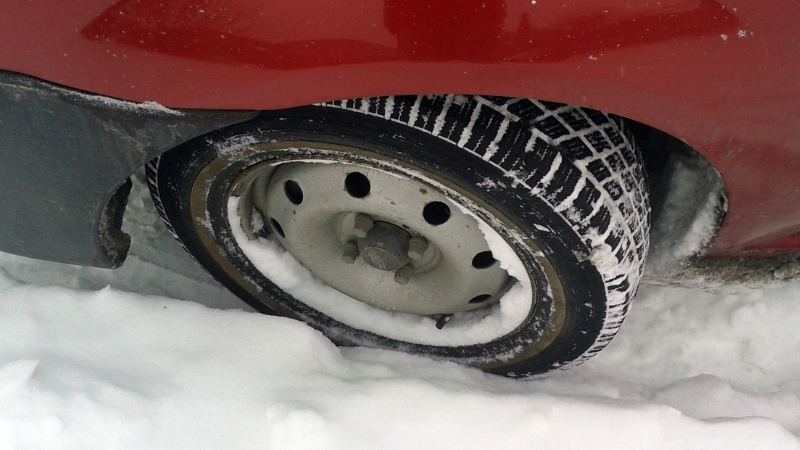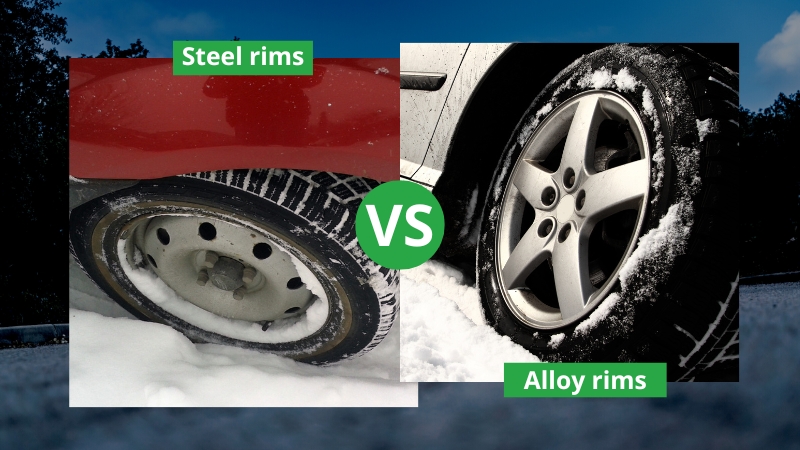When winter rolls around, it’s crucial to ensure your vehicle is well-equipped to handle the harsh weather conditions.
One key aspect to consider is whether you should use steel or alloy rims for your winter tires.
The choice between steel and alloy wheels can significantly impact your vehicle’s performance, as well as your wallet.
Steel rims have long been the popular choice for winter tire setups due to their lower cost and durability against the cold season’s challenges. However, in recent years, the price of alloy wheels has become more competitive, making it worth considering for your winter tire needs.
It’s essential to weigh the pros and cons of both options to make an informed decision that best suits your driving habits and budget for the winter months.
Steel Rims: Pros and Cons

When choosing the right rims for your winter tires, you should consider the advantages and disadvantages of steel rims.
Durability and Resistance
Steel rims are known for their strength and durability, making them a practical choice for harsh winter conditions.
They are less likely to crack compared to alloy rims and can often be hammered back into shape if bent. This resistance to damage ensures that your wheels can withstand the challenges of icy roads and rough terrain during the winter months.
Cost-Effectiveness
One of the advantages of steel rims is their lower cost compared to alloy rims. If you are on a budget or need a separate set of rims for your winter tires, steel rims are an economically friendly option that still offers functionality and reliability.
Weight and Performance
However, it is important to consider the potential drawbacks of steel rims. Steel rims tend to be heavier than alloy rims, which can negatively impact your vehicle’s handling, acceleration, and fuel efficiency. Additionally, the increased weight can lead to increased wear on your suspension and braking systems.
It is also worth noting that steel rims may lack the aesthetic appeal of alloy rims, as they generally have a more utilitarian appearance. While this may not be a primary concern for winter wheels, it is something to keep in mind if appearance is important to you.
Alloy Rims: Pros and Cons

Lightweight and Handling
Alloy rims are generally lighter than steel rims, which can provide you with improved handling and acceleration. The reduced weight also contributes to better fuel efficiency for your vehicle.
Due to their lighter weight, alloy wheels offer improved maneuverability, steering, and braking compared to their steel counterparts.
Aesthetics
One of the main advantages of alloy wheels over steel wheels is their more appealing appearance. Alloy wheels come in various designs and finishes that can significantly enhance the overall look of your vehicle. In contrast, steel rims usually have a more utilitarian appearance.
Cost and Maintenance
While alloy wheels may offer aesthetic and performance advantages, they typically come at a higher cost than steel wheels. Additionally, when it comes to repairs, alloy wheels can be more complex and expensive to fix compared to steel wheels.
It’s essential to weigh the pros and cons of alloy rims for winter tire use, factoring in your budget, performance needs, and aesthetic preferences. Ultimately, consider your driving environment and road conditions to make an informed decision.
Choosing the Right Rims for Your Winter Tires
In this section, we’ll discuss factors to consider when choosing between steel and alloy rims for your winter tires. To make the best decision, you should take into account driving conditions, vehicle compatibility, budget, and personal preferences.
Driving Conditions
When evaluating rims for your winter tires, it’s essential to examine the driving conditions you usually face. Steel rims are more resistant to harsh winter conditions, making them a suitable choice for areas with heavy snowfall and icy roads.
On the other hand, alloy rims offer better heat dissipation and are generally lighter, which may enhance your driving experience in mild winter conditions.
Vehicle Compatibility
Before selecting rims for your winter tires, ensure they are compatible with your vehicle’s specific make and model. You can find information about wheel size and fitment requirements in your owner’s manual or by consulting an expert.
Some modern vehicles have advanced systems like tire pressure monitoring or brake calipers needing clearance, which may require a specific type of rim.
Budget and Preferences
When it comes to budget, steel rims are typically less expensive than alloy rims. If you’re looking for a cost-effective option or if aesthetics are not as important to you, steel rims might be the ideal choice.
However, if you prefer a more stylish appearance and are willing to spend more, alloy rims could be the better option. They also offer a wider price range, so you can find something within your budget.
Ultimately, the choice between steel and alloy rims for your winter tires depends on your specific needs and preferences. By considering the factors mentioned above, you can select the most appropriate rims for your vehicle during the winter season.
Conclusion
In deciding whether to use steel or alloy rims for your winter tires, several factors come into play. Consider your budget, aesthetics, and performance preferences to make the best decision for your needs.
Steel rims are usually a more affordable option and can suffice for basic winter tire needs. Keep in mind that they may require touch-ups for rust spots and come with limited style options. However, they can be updated with wheel covers to improve appearance.
On the other hand, alloy rims add style to your vehicle during winter and offer better performance due to their lightweight nature. While they might require a larger initial investment, alloys can offer long-term durability and better resistance to salt damage when appropriately maintained.
Ultimately, the choice between steel and alloy rims for your winter tires depends on your priorities and the value you place on cost, aesthetics, and performance.
By weighing these factors, you can confidently choose the right rims for your winter tires, ensuring a safe and enjoyable driving experience throughout the season.
Hi, my name is Niklas, the head content creator & CEO of Whirling Wheelz. I am very interested in vehicles of all kinds, mainly cars. I have a car mechanics degree from high school and a big hobby of mine is to follow the WRC (World Rally Championship) both online and through travel.


